

Google to buy Motorola Mobility for $12.5 billion - Aug. 15. Google has signed a deal to buy Motorola Mobility for $12.5 billion.
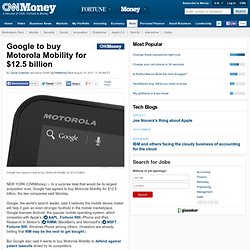
NEW YORK (CNNMoney) -- In a surprise deal that would be its largest acquisition ever, Google has agreed to buy Motorola Mobility for $12.5 billion, the two companies said Monday. Google, the world's search leader, said it believes the mobile device maker will help it gain an even stronger foothold in the mobile marketplace. Google licenses Android, the popular mobile operating system, which competes with Apple's (AAPL, Fortune 500) iPhone and iPad, Research In Motion's (RIMM) BlackBerry and Microsoft's (MSFT, Fortune 500) Windows Phone among others.
Google's next step after Motorola: Buy Sprint? - Aug. 16. NEW YORK (CNNMoney) -- Google is best known as a search company.
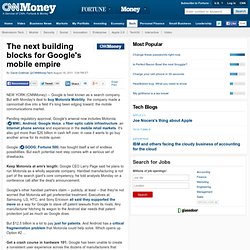
But with Monday's deal to buy Motorola Mobility, the company made a cannonball dive into a field it's long been edging toward: the mobile communications market. Pending regulatory approval, Google's arsenal now includes Motorola (MMI), Android, Google Voice, a fiber optic cable infrastructure, an Internet phone service and experience in the mobile retail markets.
It's also got more than $26 billion in cash left over, in case it wants to go buy another arrow for its mobile quiver. Google (GOOG, Fortune 500) has bought itself a set of endless possibilities. But each potential next step comes with a serious set of drawbacks. Keep Motorola at arm's length: Google CEO Larry Page said he plans to run Motorola as a wholly separate company. Google's other handset partners claim -- publicly, at least -- that they're not worried that Motorola will get preferential treatment. But $12.5 billion is a lot to pay just for patents. Google, wireless and core competencies - Blue Sky On Mars. Apparently, Google is readying a bid for wireless spectrum.
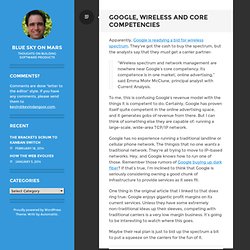
They’ve got the cash to buy the spectrum, but the analysts say that they must get a carrier partner: “Wireless spectrum and network management are nowhere near Google’s core competency. Its competence is in one market, online advertising,” said Emma Mohr McClune, principal analyst with Current Analysis. To me, this is confusing Google’s revenue model with the things it is competent to do. Certainly, Google has proven itself quite competent in the online advertising space, and it generates gobs of revenue from there. Google wants 'dark fiber' Is Google planning to build a global fiber-optic network from scratch?
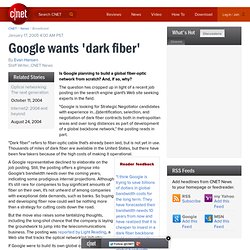
And, if so, why? The question has cropped up in light of a recent job posting on the search engine giant's Web site seeking experts in the field. "Google is looking for Strategic Negotiator candidates with experience in... (i)dentification, selection, and negotiation of dark fiber contracts both in metropolitan areas and over long distances as part of development of a global backbone network," the posting reads in part.
"Dark fiber" refers to fiber-optic cable that's already been laid, but is not yet in use. Evil Google - Google Open Access Moves Threaten Verizon 4G iPhone. If you're a Google Watcher, you remember how the company tried to throw a wrench into Verizon Wireless plans by bidding for 700 MHz wireless spectrum three years ago.
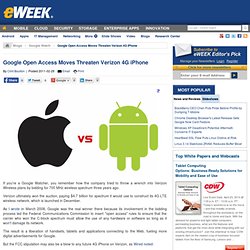
Verizon ultimately won the auction, paying $4.7 billion for spectrum it would use to construct its 4G LTE wireless network, which is launched in December. As I wrote in March 2008, Google was the real winner there because its involvement in the bidding process led the Federal Communications Commission to insert "open access" rules to ensure that the carrier who won the C-block spectrum must allow the use of any hardware or software so long as it won't damage its network. The result is a liberation of handsets, tablets and applications connecting to the Web, fueling more digital advertisements for Google. But the FCC stipulation may also be a blow to any future 4G iPhone on Verizon, as Wired noted: Google launches open access FTTH network trial.
Are you dissatisfied with your slow DSL connection or spotty cable modem connection?
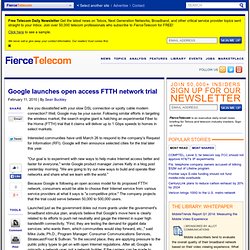
Well, Google may be your savior. Google's open access challenge. You can have the money if you break the monopoly.
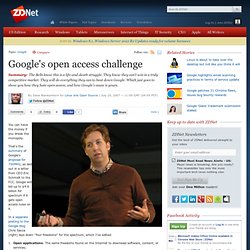
That's the summary of Google's proposal for 700MHz, as laid out in a letter from CEO Eric Schmidt to the FCC. What Exactly Does Google Want From The 700 MHz Auction? Everyone has their eyes on the upcoming Federal Communications Commission (FCC) 700 MHz wireless auction, and not just the folks in the tech world, but also stock brokers and wealth managers.
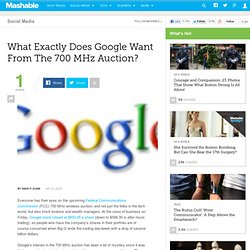
At the close of business on Friday, Google stock closed at $600.25 a share (down to $598.30 in after hours trading), so people who have the company's shares in their portfolio are of course concerned when Big G ends the trading day/week with a drop of several billion dollars. Google's interest in the 700 MHz auction has been a bit of mystery since it was first rumored to be planning to partake in the process some months ago. They told the FCC they would guarantee a minimum of a $4.6 billion bid if the FCC agreed to keep a portion of the frequency open access so that anyone could connect to it. The FCC agreed, and this seemed to very quickly fuel shifts in the wireless marketplace as Verizon went ahead and announced the impending opening of their network.
I think the issue Mr. Mr. Google's battle for wireless spectrum. Google to Bid for 700 MHz Spectrum. Google intends to bid on wireless spectrum in the 700MHz band when the U.S.
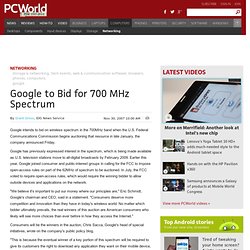
Federal Communications Commission begins auctioning that resource in late January, the company announced Friday. Google has previously expressed interest in the spectrum, which is being made available as U.S. television stations move to all-digital broadcasts by February 2009. Google versus the telecoms. There may just be a Google phone after all.
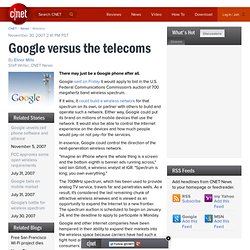
Google said on Friday it would apply to bid in the U.S. Federal Communications Commission's auction of 700 megahertz band wireless spectrum. If it wins, it could build a wireless network for that spectrum on its own, or partner with others to build and operate such a network. Either way, Google could put its brand on millions of mobile devices that use the network. It would also be able to control the Internet experience on the devices and how much people would pay--or not pay--for the services. In essence, Google could control the direction of the next-generation wireless network. "Imagine an iPhone where the whole thing is a screen and the bottom eighth is banner ads running across," said Iain Gillott, a wireless analyst at IGR.
The 700MHz spectrum, which has been used to provide analog TV service, travels far and penetrates walls. 700 MHz Explained in 10 Steps. Last week we reported on the web giants Google, Yahoo and eBay setting aside their differences and joining forces with satellite television providers, demanding that they should have some say in what the FCC does with the 700 MHz spectrum. The spectrum, currently owned by broadcasters, has been used for analog television. But it is set to be turned over to the government in 2009.
Due to its broadcast-attractive physics (like its ability to penetrate walls), this spectrum is desirable for both broadband communications in general and public-safety uses in particular. Google Calls 700-MHz Auction A Major Victory For Consumers. The results are in, and Google didn’t end up winning that beachfront C-block spectrum. But don’t start feeling bad for the company. Here’s why: Google, as we learned on Thursday, did manage to lock in the open access rules by throwing up the minimum $4.6 billion bid early in the game — a move that basically forced Verizon Wireless to pony up even more money for the national spectrum licenses and accept a set of rules that it had previously sued the FCC over.
Not bad, when you consider Google didn’t pay a cent to do it (well, other than lobbying fees). Based on a brief post on Google’s Public Policy Blog, the company is apparently very proud of these accomplishments insofar as they will give you and I the power to use any ol’ phone or application we please on this new hot spectrum. Could that internet-like freedom be happening on Android mobile phones, I wonder? Remember what Google has achieved so far: The company successfully pushed an open access agenda with FCC Chairman Kevin Martin. Alan Reiter - Google Should Buy 700 MHz Cellular Licenses. 700 mhz.